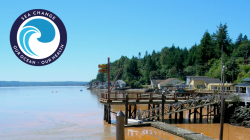New Marine Science iBook “Harmful Algal Blooms” to be Launched to Boost Ocean Literacy in European Schools
Opportunities to increase awareness of the ocean are limited in the junior cycle science curriculum across Europe. Dr Christine Domegan, lead methodologist for Sea Change, Whitaker Institute, NUI Galway, explains: “To co-create Ocean Literacy we need collaboration, discussion, participation and engagement across multiple stakeholders in Europe; from policy makers, to educators, and from media to mariners, children and grandparents.” This iBook is designed to infuse the engaging story of harmful algal blooms into teaching across the sciences. Harmful algal blooms, or HABs, occur when colonies of algae - simple plants that live in the sea and freshwater - grow out of control while producing toxins that can have harmful effects on fish, shellfish, marine mammals, birds and people. During the launch, the author, Dr Robin Raine, from Earth and Ocean Sciences, NUI Galway, will speak about his experiences at the heart of the book. The audience will also be introduced to the teaching design used within the book, which aims to ensure the content can be taken up by science teachers and students to advance a “Sea Change” in Irish and European Ocean Literacy. The great response from both teachers and students after piloting the iBook in Irish, Swedish, and Belgian schools is a step forward to introducing Ocean Literacy into more aspects of education. Co-editors Dr Veronica McCauley and Dr Kevin Davison of NUI Galway’s School of Education, believe: “Teachers are becoming more technology-savvy in the classroom and are finding innovative ways to teach the curriculum so that it encourages personal interest in the sciences.” The importance of the ocean, and therefore Ocean Literacy, cannot be overestimated. The ocean defines and dominates everything about our planet. It is home to most of the life on Earth, regulates our weather and climate, provides much of our oxygen, and helps to feed the human population. Dr Robin Raine, author and lecturer at NUI Galway, says: “This book will introduce students to important features of our ocean as well as harmful algal blooms. It will act as a resource for teachers to strengthen and promote science through the topic of marine science.” To confirm your attendance at the launch, please register at: www.eventbrite.ie/e/launch-of-harmful-algal-blooms-ibook-tickets-32407091483. For further information, contact Dr Veronica McCauley on veronica.mccauley@nuigalway.ie. Discover more about past, current and upcoming Sea Change resources and initiatives at: www.seachangeproject.eu follow Sea Change on Twitter (@SeaChange_EU) or like us on Facebook (@SeaChangeProjectEU). Notes for Editors The Sea Change project is funded by the European Union's Horizon 2020 research and innovation programme under Grant Agreement n° 652644. The project began in March 2015 and will run until February 2018. The Marine Biological Association, UK (MBA) is coordinating the project. AquaTT is the project dissemination partner. The Harmful Algal Bloom iBook author Dr Robin Raine is a biological oceanographer in Earth and Ocean Sciences discipline, NUI Galway. His research has focused on the interaction between physical oceanography and phytoplankton, in particular the initiation of harmful algal blooms around the Irish coastline. He has developed simple predictive models that can be used by shellfish producers so that they can minimise and mitigate the harmful economic effects these blooms cause. In 2003 he was nominated onto the Scientific Steering Committee of GEOHAB (Global Ecology and Oceanography of Harmful Algal Blooms, the UNESCO-IOC-SCOR project on harmful algae), and became chairman in 2006. Recently, his research outputs have taken the form of DVD, illustrated booklets, etc. in an effort to inform the wider scientific community about HABs. For press queries, please contact the project Communications Officer: Tanja Calis, AquaTT (email: tanja@aquatt.ie, Tel: +353 1 644 9008)
Keywords
harmful algal blooms, ocean literacy, marine science
Countries
Austria, Belgium, Bulgaria, Cyprus, Czechia, Germany, Denmark, Estonia, Greece, Spain, Finland, France, Croatia, Hungary, Ireland, Italy, Lithuania, Luxembourg, Latvia, Malta, Netherlands, Poland, Portugal, Romania, Sweden, Slovenia, Slovakia, United Kingdom



